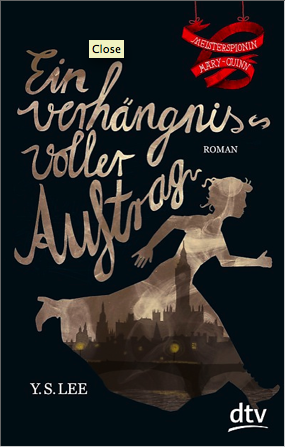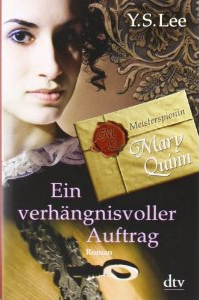Y.S. Lee's Blog, page 22
December 12, 2012
Negotiating with tradition
Hello friends! We celebrate Christmas in our house, and we’re still figuring out our traditions. I come from a family whose only tradition is to not have any traditions (even the Christmas tree was hit-and-miss throughout my childhood, and I doubt we’ve ever eaten the same Christmas dinner twice), and my spouse, Nick, is from a family with very strong, sentimental rituals. He and I have talked about what kinds of traditions we want to cultivate. The problem? Our lives are so hectic right now that it seems as though every year, we crash-land in the middle of December with no fruitcake, no lights, and the vaguest of plans to get a tree “soon”.
We have to get our act together.
So this morning I was thinking, what are the most important Christmas traditions for our family? Clearly, we’re going to have to be selective, this year. For me, it’s about a special family meal that we look forward to each year. There will be small menu changes, but it’s not going to be Chinese food one year, followed by Italian the next. For Nick, it’s about the tree and the excitement of Father Christmas for little kids. Following in his dad’s tradition, Nick will create tiny reindeer hoofprints for the kids to find on Christmas morning, as evidence of Santa’s visit. For our four-year-old, it’s all about the gingerbread house, aka an excuse to eat unlimited amounts of Smarties and buttercream icing. And our littlest one is just learning about Christmas, which means she’ll be very forgiving of any amount of last-minute holiday anarchy.
As the kids grow, become more independent, and develop interests of their own, our traditions will evolve. We’ll get to the Christmas baking, the crafty ornaments, the homemade Advent calendar, the big Christmas party – one day. In the meantime, we’ll focus on our dearest rituals and enjoy them to the fullest.
What are your favourite, most-loved holiday traditions?
P.S. There’s a nearby family farm that raises heritage-breed bronze turkeys. The birds roam outdoors, get lots of sunshine, eat organic food (and bugs), and generally have happy turkey lives. We’re all set – for 2013, that is. Yes, we’re waiting on a turkey that hasn’t even been born yet. We are going to be SO ready next year!
December 5, 2012
Are we all laughing at the same thing?
Somewhere in the wilds of the internet, I clicked through to the comedy sketch State Home for Manic Pixie Dream Girls. It’s fairly funny, in my opinion, although there’s a clangingly callous throwaway joke at the end that ruins it for me. But I was slightly irked by its underlying assumption that the Manic Pixie Dream Girl character is the main thing to be mocked: stupid MPDGs, who start out so refreshing and redemptive, until men weary of their whimsy. Hang on a second. Shouldn’t the mockery be aimed at the creators of the MPDG? There’s a brief flash of this in the State Home video, but it goes unexplored.
I was going to write a post about this until I realized that Feminist Frequency has already done it! It’s a bit more serious than I’d have been, but it’s all there. Take it away, FF!
If you want a transcript of the video, it’s here. And there’s some interesting conversation to be had in the comments, too. And now I’m off to read more about Feminist Frequency. Oh, the internets.
November 28, 2012
Writing a book is not like having a baby
That’s stating the obvious, isn’t it? Yet for the last few weeks, I’ve noticed a lot of references to “labour” and “birth”, to “midwives” and “newborns” – and these people aren’t talking about tiny humans.
This complaint may sound grumpy and petty; it’s not intended that way. I’m not disparaging the thousands of hours of hard work that go into either enterprise. Having chosen to engage in both, it’s only reasonable that I also love them both. But when we overuse this analogy, it deflates the delicate, consuming, enormously frustrating, and endlessly rewarding disciplines of both writing and child-rearing.
Writing is both easier and more difficult than having a baby because:
1. It fits into your schedule. If you don’t create time to write, you don’t write! (Try putting your colicky infant on hold that way…)
2. It hones skills you were already good at. I’m a voracious reader and I excelled in English all through school – a thoroughly typical profile for a writer. The things you learn daily as a writer tend to be subtle and they make you a slightly better craftsman in small but satisfying ways. The first diaper I ever changed, though? On my newborn son’s tiny, flailing, slippery bum, while I was stunned by opiates, full of stitches, and tethered to an IV pole. Why hello, learning curve.
3. Babies grow, develop, and become ever-more-interesting individuals. Your published book will always contain that typo you missed on p. 187.
4. A published book never grows less beautiful. Children become adolescents.
5. When writing, you are the boss. When parenting, you are a teacher/social worker/butler/wallet.
6. When writing, I am recognizably and consistently myself. When parenting, I am sometimes my own enemy, but more often I feel inspired to be a better human being.
What do you think of the book/baby analogy? Did I miss anything?
November 21, 2012
The inimitable (redux)
Hello, friends. I’ve been enjoying Claire Tomalin’s Charles Dickens: A Life so very much, and I was deliberately slowing down towards the end so as to spin it out a bit longer. (Anybody else do that?) But I finished it last night with an immense sigh of satisfaction. And I’ve been thinking about Dickens’s reckless, utterly driven pace of life and death.
It was clear that his death was approaching. He’d had a stroke, was increasingly weak, and unable to walk at times, but he persisted in keeping up a demanding schedule of public appearances. In his last, dying days, Dickens:
- met with Queen Victoria, rather reluctantly, and fumed about her “preposterous” book, Leaves from the Journal of Our Life in the Highlands, behind her back
- gave a final series of public readings, in which he couldn’t pronounce “Pickwick”. It came out, variously, as Pickswick, Pecknicks, and Pickwicks
- dined with the American ambassador and Disraeli, and breakfasted with Gladstone
- advised his daughters in an amateur theatrical they were putting on
- supervised extensive renovations to his country house at Gad’s Hill
- made an inventory of the spirits consumed at Gad’s Hill House: rum, sherry, brandy, and “Very Fine Scotch Whiskey”
- and, of course, worked on his last, unfinished novel, The Mystery of Edwin Drood
As Tomalin points out, there’s a huge amount of contradiction here. Even as Dickens acknowledged his mortality with a farewell reading tour and getting his will and other papers in order, he was also renovating his house, worrying about how much whiskey remained in the cellar, and writing instalments of another full-length novel.
His last days stand in sharp contrast to those of Jane Austen, who also knew she was dying. Austen’s priority (apart from her family) was to finish her last, masterful novel, Persuasion, and I’ve always been convinced by arguments that Persuasion ends so rapidly because Austen was working against time.
Tomalin’s final paragraph is a brilliant compression of the major themes and ideas she develops through the book. It’s too long to quote here, but if you’re at all interested in Dickens as a writer, I urge you to read this bio. It does everything a good biography should: expanded and enhanced my appreciation for the subject, inspired me to read more about people and things related to Dickens, and galvanized me to start re-reading the novels.
I think I shall begin with Great Expectations.
November 14, 2012
Monsters of entitlement
Hello, friends. I’ve been reading a light, slick, funny book of cultural observation and enjoying it very much. And it’s a – gasp! – parenting book. Doesn’t that seem like a contradiction in terms?
It’s Bringing Up Bébé by Pamela Druckerman (in the UK, it’s called French Children Don’t Throw Food). It was published earlier this year, to a predictable squawk of gossip, defensiveness, and some reluctant concessions that Anglo-American parenting is imperfect. (This review is somewhat typical – much more about the reviewer’s own experience than about the book.) It seems that we don’t like to think about a parenting culture that’s not “child-centred”.
What I loved about this book (and which I haven’t yet seen mentioned in a review) is Druckerman’s distillation of what seems to underlie what she calls French parenting. It is the assumption that babies are small people with an immense capacity to learn, right from the beginning. Amazing! Druckerman traces this attitude all the way back to Jean-Jacques Rousseau’s 1762 book Emile, or On Education.
In practice, this means that instead of reorganizing their lives around children’s desires, French parents start to teach children how to be rational members of a society from a very early age. Instead of “discipline”, they talk about “education”; instead of “development”, they use the term “awakening”. They take pride in being strict. They allow children immense freedom within a strong framework of rules. They speak politely to babies, because babies are individuals, too.
To me, this doesn’t sound uniquely French. As my friend S at Waldorf Yarns observes, it’s familiar to Waldorf parents (S gives a sample list). S also theorizes, “I can’t help but wonder if some of what is presented as ‘the French’ way of parenting may be European and may have infused into Waldorf education before it was transplanted into our corner of North America.” I’d just add that Druckerman’s “French” parenting also sounds a lot like Maria Montessori’s philosophy of education. It’s no accident: both Waldorf and Montessori education are founded upon the idea of respect for the child.
As you can tell, I’m a believer. Do I think French parenting (or any single method or ideal) is perfect? Mais non, pas du tout! But it’s a beautiful, rational, and sane starting position that gives me hope that we can raise thoughtful, compassionate citizens, not monsters of entitlement.
November 7, 2012
It was a dark and stormy night.
Hello, friends. I was just tinkering with what I think will be the first chapter of Rivals in the City and thinking about Elmore Leonard’s dictum, “Never open a book with weather.” (There’s a ton more writing rules here, if that’s your sort of thing.) And I’m not at all sure weather should be forbidden, let alone the first thing Leonard chooses to condemn.
The infamous “It was a dark and stormy night” is often cited as a bad beginning and an example of purple prose, but really, it’s perfectly all right. It’s a clear and straightforward sentence. It creates mood and promises action in seven words, none of which is extraneous. And its author, Edward Bulwer Lytton, was a successful Victorian novelist whose public apparently enjoyed his having started with the weather, as well as the very ornate sentence that follows it.
And I was recently reminded of the power of starting with the weather in the opening chapter of Dickens’s Bleak House. Here’s the full first paragraph:
LONDON. Michaelmas Term lately over, and the Lord Chancellor sitting in Lincoln’s Inn Hall. Implacable November weather. As much mud in the streets as if the waters had but newly retired from the face of the earth, and it would not be wonderful to meet a Megalosaurus, forty feet long or so, waddling like an elephantine lizard up Holborn Hill. Smoke lowering down from chimney-pots, making a soft black drizzle, with flakes of soot in it as big as full-grown snow-flakes — gone into mourning, one might imagine, for the death of the sun. Dogs, undistinguishable in mire. Horses, scarcely better; splashed to their very blinkers. Foot passengers, jostling one another’s umbrellas in a general infection of ill-temper, and losing their foot-hold at street-corners, where tens of thousands of other foot passengers have been slipping and sliding since the day broke (if the day ever broke), adding new deposits to the crust upon crust of mud, sticking at those points tenaciously to the pavement, and accumulating at compound interest.
I can’t imagine a writer pulling this off now, but it’s a splendid beginning. It begins like a telegram or a bit of news reporting (“London. Michaelmas term lately over…”), then immediately turns the weather into an adversary (“implacable”). From this terse economy, it suddenly springs into science fiction cut with absurd comedy (a Megalosaurus waddling up Holborn Hill), horror (“the death of the sun”), and disease (“a general infection of ill-temper”). After coating the world and its contents with filth and mud, Dickens introduces the theme of money (“accumulating at compound interest”) that circulates through the book. Quite a feat for a paragraph that’s all about the weather, hm?
Now, I’m not even considering comparing myself to Dickens or Elmore Leonard, but my point here is, let’s lighten up with the writing rules, shall we? Because sometimes, it really is a dark and stormy night.
October 31, 2012
A Bear in the House
Hello friends, and Happy Hallowe’en day! It’s cool and raining here in Kingston, and we’re all very grateful that Hurricane Sandy lost momentum before getting here. It’s strange to think of so many communities still without power, still scrabbling for basic needs, while we here contemplate costumes and candy. It’ll be a bittersweet Hallowe’en, for sure.
I thought I’d show you what I’m up to this morning: finishing up a costume for a four-year-old who wants to be “a big brown bear”.
The ears are still waiting to be attached. Then all we need is brown pants, some black eyeliner for a nose and whiskers, and the roaring can begin!
I hope you have a Hallowe’en that’s memorable for all the best reasons.
October 24, 2012
The Inimitable
Hello, friends. Yesterday, I began reading Claire Tomalin’s latest biograpy, Charles Dickens: A Life. I had extremely high hopes for this book, so much so that I worried that my hopes were unreasonably high and I might inevitably be disappointed. But it begins beautifully, and this week I just want to share some of my glee with you.
The biography starts with three maps and a Cast List – essential in a book as jammed with places and personalities as this one. One of the reasons I love this kind of front matter and pore over it for ages before launching into the actual book is because they reveal so much about the author’s interests. Her voice is as strong there as anywhere else in the book, and diving into a list like that is a perfect way to get acquainted (or reacquainted, in this case). I’ll show you what I mean:
On the map called Dickens in Central London, the Garrick Club is described thus: “Dickens a member from 1837, resigning and rejoining frequently”. A perfect window into the man, in four words!
Here are a couple of the extremely varied people he associated with:
“Cooper, Louisa… sent to Cape, returned 1856, bringing D[ickens] an ostrich egg…”
“Elliott, Frances… heiress with rackety marital history… persuaded D to intervene in her difficulties in 1860s, questioned him in vain about his private life”
And Tomalin’s judgement on others:
“Morson, Mrs Georgiana… matron of Miss Coutt’s Home [for reformed thieves and prostitutes] from 1849 to 1854 when she remarried. A pearl.”
“Townshend, Chauncey Hare… rich, Cambridge-educated hypochondriac… dedicated poems to D, who dedicated Great Expectatiosn to him, gave him manuscript – huge reward for foolish friend”
Also, Dickens gave his kids really florid names! They often seem to be modified versions of the names of famous people, as in “Walter Landor” (why skip the “Savage”?) and Alfred D’Orsay Tennyson (really? He chose to interrupt Alfred Tennyson’s name with “D’Orsay”?). Other times, he went for the full homage, naming two of his sons “Henry Fielding” and “Edward Bulwer Lytton”.
I’m hooked.
October 17, 2012
For once in my life, I am part of the zeitgeist
…in a bookish way, of course. As you probably know, Hilary Mantel is now the first woman to win the Booker prize twice. And she’s done it with linked works of historical fiction! If you’re a regular reader of this blog, you know how much I adore Wolf Hall and Bring Up the Bodies, and you know how thrilled I am.
I’m also excited on a more personal level, because of a small package that arrived in yesterday’s mail, containing this:
This is the German paperback edition of A Spy in the House, which will be published on November 1, 2012. Isn’t it lovely? It’s entirely different from the hardcover:
And I prefer it. It’s clean, dramatic, a bit younger-looking, and it reminds me in the happiest possible way of Stephanie Burgis’s delightful UK covers for her Kat, Incorrigible series. I’m so grateful to my German publisher, DTV, for this exquisite re-imagining! The Agency series is called Mary Quinn, Meisterspionin in German, and DTV have also created a wonderful mini-site, www.meisterspionin.de, to go with it!
What do you think? And do you have a favourite cover?
October 10, 2012
Scenes from a suburban adolescence
Hello, friends. Yesterday, I read Amusingly Horrible Things Moms Have Said at The Hairpin. It’s fairly amusing; certainly not the best thing I’ve read on the internet, but it must have stirred something in my Brain Soup, because early this morning, I remembered two things I’ve not thought of in many, many years:
1. From age 14 to 18, every time I went to the corner store (only a couple of times a year, since I was raised to believe that Buying Things at Convenience Stories is Wrong Because Said Things are Overpriced and Probably Stale. Occasionally, I went to get cigarettes for my uncle – but let’s not mention that to my parents, okay?), the owner stared at me for several seconds too long, then asked if I wanted to meet his son.
Questions to self: Does he ask that of every teenaged girl who comes into the store? Does he realize he’s asked me this before? Many times? And if so, does he think his 5 years of persistence will eventually pay off?
Closure: Never. I went away to university, and then my parents moved house. I really should have just asked him all those questions, shouldn’t I?
2. One summer, I worked at a coffee shop. One day, my boss said to a regular, “Has anyone ever told you that you look just like Karla Homolka [a convicted serial killer]? I mean, you guys could be twins!” When I registered horror, my boss said, “What? What? It’s a compliment! She’s really hot!”
Questions to self: Why didn’t I quit my job? This was a sign of things to come, with that boss. Also, why didn’t I say to the customer, “I don’t think you look like a serial killer”?
Closure: The customer came back a couple of weeks later (I guess she was less appalled than I was? Or was really desperate for this indie coffee shop to thrive?), and I got a chance to tell her that she didn’t look like a serial killer, to me. Then I gave her a free drink. Also, the coffee shop folded a couple of months later. Literal closure!
Why am I bringing up all this now? As Victorian novelist Frances Trollope once said, “Of course I draw from life – but I always pulp my acquaintances before serving them up. You would never recognize a pig in a sausage.” One day, both these incidents will probably make it into my fiction. If you spot them then, you’ll know just where they came from.
What bizarre or uncomfortable teenaged memories are rattling around in your brains? Have you fictionalized them, yet?






